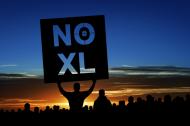
The unethical reality of tar sands oil and the Keystone XL pipeline
 Recently, the Speaker of the Nebraska Legislature, Mike Flood, spoke with the York News-Times about his views on the Keystone XL pipeline, which, as proposed, would run through environmentally sensitive parts of Nebraska.
Recently, the Speaker of the Nebraska Legislature, Mike Flood, spoke with the York News-Times about his views on the Keystone XL pipeline, which, as proposed, would run through environmentally sensitive parts of Nebraska.
Amidst expressing lukewarm concern about the pipeline’s safety, Flood repeated an oft-used but oft-refuted argument for supporting the pipeline.
He asserted that tar sands oil coming from Canada is “better” for the United States, especially when “we buy billions of dollars worth of oil from countries such as Venezuela and the Middle East…countries that don’t value human rights.” In essence, Flood made the claim that tar sands oil is more “ethical” than conventional oil.
This sort of argument is not only misleading in its specific assertions, but also fails to see the bigger picture at the same time. There have been countless articles written refuting this claim from many different angles including the real ethical costs of tarsands spills on towns and the Kalamazoo river. Disputing the “ethical oil” claims is easy and this summer there’s one argument against Flood’s assertion and support of the pipeline that stands out even more – climate change.
Currently, more than half of the counties in the United States have been declared disaster areas due to some sort of extreme weather event affecting their locales in recent weeks. Once more: half of the country is a disaster area.
That’s a scary statistic, and now, more than ever, science is showing that climate change is playing a part in many of the events causing these disasters. Nebraska has seen some of the worst drought and wildfires in generations. Crops and cattle are at-risk because of the extreme weather witnessed across the state.
So, as we look at the “ethics” of tar sands oil, it’s only responsible to examine the full effects of what a pipeline transporting this oil will really have on this country and our futures. Recently some of the leading climate scientists suggested just that, and 22 members of the US Congress have now demanded the same as well.
The simple fact is that no new oil is ethical in this day and age, as so articulately outlined by Bill McKibben in a recent article in Rolling Stone. Continuing to invest in fossil fuel infrastructure projects is to choose to ignore the climate impacts that are smacking us in the face every day this summer, whether they are heat waves, floods, droughts, or dangerous storms.
Tar sands oil is the dirtiest of the dirty – causing far more greenhouse gas emissions than even dirty conventional oil. With each barrel produced and consumed, we’re locking in ever more emissions that contribute to dangerous climate change while putting off the much-needed transition to a cleaner energy economy.
On top of the poor ethics of investing in climate-altering fossil fuel projects, there are indeed human rights concerns in Canada where the tar sands are mined. First Nations in particular are experiencing higher rates of cancer, polluted drinking water, toxic air and other health effects from the mining of this dirty fuel. Counter to what you’d expect from a country that “values human rights”, the Canadian government is largely choosing to ignore these concerns as they pursue their goals of becoming the next “energy superpower”.
Indeed, recent legislation aimed at weakening environmental safeguards and diminishing the rights of Canadian citizens to question tar sands infrastructure are starting to make Canada look like many of its Petro-state brethren.
Perhaps surprisingly, even the trade publication Petroleum Economist has seen through the “ethical oil” argument, pointing out in an editorial that “[t]he wider ethical question is whether the world ought to consume oil at all, given the prospects of damaging the climate if we continue to abuse hydrocarbons as we do now.” They concluded with the salient point that “[e]thical energy is energy that reaches the starving, not the obese.”
The latter point goes straight to the heart of the issue. America is so gorged on oil and the wealth it has bestowed on the rich and powerful that its politicians are incapable of making the decisions necessary to prevent massive ecological destruction. Politicians are incapable of doing work for the people and the safety of our communities.
Before making claims that tar sands oil – and the proposed Keystone XL pipeline that would transport it through our heartland – is a better choice, Mr. Flood should be sure to get his facts straight. The Keystone XL pipeline is a project that would perpetuate a dirty energy system that threatens our futures, contributes to human rights abuses in Canada, pollutes water and air, and splits the country in half. Supporting the Keystone XL pipeline is far from the ethical choice.
